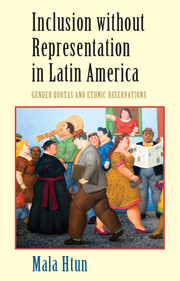Book contents
- Frontmatter
- Dedication
- Contents
- List of Tables and Figures
- Preface and Acknowledgments
- List of Acronyms
- 1 Introduction: Politics of Inclusion in Latin America
- 2 Women, Afrodescendants, and Indigenous Peoples in Elected Office
- 3 Gender Quotas: Why and How?
- 4 Indigenous Reservations and Gender Parity in Bolivia (written with Juan Pablo Ossa)
- 5 Political Inclusion in Colombia
- 6 Brazil: Combatting Exclusion through Quotas in Higher Education
- 7 After Quotas: Women's Presence and Legislative Behavior in Argentina (written with Marina Lacalle and Juan Pablo Micozzi)
- 8 Conclusion
- Appendix 1 Research Trips
- Appendix 2 Mechanisms of Inclusion
- References
- Index
Preface and Acknowledgments
Published online by Cambridge University Press: 18 December 2015
- Frontmatter
- Dedication
- Contents
- List of Tables and Figures
- Preface and Acknowledgments
- List of Acronyms
- 1 Introduction: Politics of Inclusion in Latin America
- 2 Women, Afrodescendants, and Indigenous Peoples in Elected Office
- 3 Gender Quotas: Why and How?
- 4 Indigenous Reservations and Gender Parity in Bolivia (written with Juan Pablo Ossa)
- 5 Political Inclusion in Colombia
- 6 Brazil: Combatting Exclusion through Quotas in Higher Education
- 7 After Quotas: Women's Presence and Legislative Behavior in Argentina (written with Marina Lacalle and Juan Pablo Micozzi)
- 8 Conclusion
- Appendix 1 Research Trips
- Appendix 2 Mechanisms of Inclusion
- References
- Index
Summary
I began to observe inclusion without representation in the mid-1990s. I was consulting for the Inter-American Dialogue and participating in meetings with women politicians, government officials, and activists from all over the Americas. At those events, I witnessed disagreements about the objective of women's inclusion in power. Some believed that the point of women's presence was to advance the representation of women's interests and other democratic values. Others simply wanted women there, regardless of their views or behavior. As one very senior government official put it: “If there are going to be dictators, we want women dictators too.”
In light of these experiences, I had little faith in the hypothesis that the presence of more women in power would lead to better representation of women's interests and policy changes. I didn't believe that women and other disadvantaged groups had inherent interests. I had seen too much diversity among women, even among those from an elite political class willing to participate in women's meetings, to believe they would act collectively to pursue a political agenda without a great deal of prior work. Some women I met were committed feminists; others were more like Margaret Thatcher. Some had spent their careers fighting for human rights; others were relatives of golpistas.
Part of my early work involved identifying and analyzing various governmental initiatives to expand women's rights. States were creating new agencies for women, adopting national action plans and gender-sensitive budgets, modifying laws to combat violence, creating women's health programs, protecting rights of domestic workers, improving access to child care, and expanding services for victims of violence. These programs were not always well implemented or adequately funded, but their mere existence marked a dramatic change over the past.
I did not see greater government attention to women's rights as causally linked to women's greater numbers in power. Instead, I attributed policy changes to the influence of international norms and agreements, pressure from civic movements, and the autonomous action of highly placed and committed individuals. If anything, women's greater access to power was occurring simultaneously with other policy changes. In some places, there was representation without inclusion.
I came later to the study of Afrodescendants and indigenous peoples. Except in the case of Brazil – in which I had a longstanding interest and passion – my motivation was primarily comparative.
- Type
- Chapter
- Information
- Inclusion without Representation in Latin AmericaGender Quotas and Ethnic Reservations, pp. xiii - xviPublisher: Cambridge University PressPrint publication year: 2016



